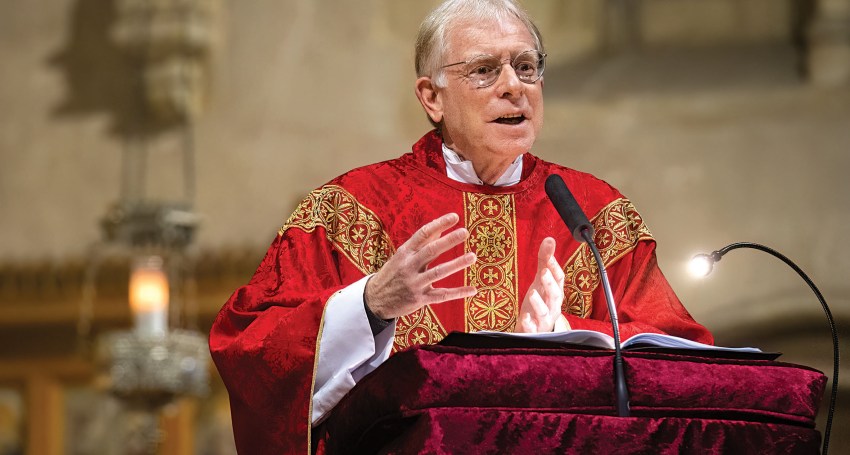No one is called to follow on their own
Opinion
In reflecting on the Christian life in homilies over the years I’ve often said ‘no one is a Christian on their own’. It’s my way of naming how we are saved in Christ.

The Dogmatic Constitution on the Church from the Second Vatican Council puts it this way:
‘God…has, however, willed to make men holy and save them, not as individuals without any bond or link between them, but rather to make them into a people.’ It then proceeds to speak of all the baptised as being ‘a chosen race, a royal priesthood, a holy nation…who in the times past were not a people but now are the People of God’.
Advertisement
We are saved precisely by being brought together as the Church, the People of God. Each of the baptised is part of the Church and is called to collaborate for the sake of being ‘the light of humanity’. Church is not just a nice added extra, but God’s way of saving us. Our faith is deeply personal in terms of a personal encounter and relationship with the Lord, but also essentially communal in terms of our unity as Church.
At this time of National Vocations Awareness Week throughout Australia, encompassing the first two weekends of August, it’s important to understand likewise that every vocation is deeply personal but also essentially communal. No one is called by God in isolation. We hear the voice of God speaking to us through human voices. The poverty of body and spirit of so many calls out to us. We see and experience God and His love through others and we are encouraged and supported to respond because of others. A vocation is nurtured within the context of the faith of a Christian family, parish community and indeed the universal Church and then precisely for service and mission within the Church community for the world.
In his message for World Day of Prayer for Vocations earlier this year, entitled ‘Vocation: Grace and Mission’, Pope Francis speaks of a vocation as: ‘not carried out by us alone, but always in ecclesial communion, together as brothers and sisters…for this has always been God’s dream that we should live with him in a communion of love’.
In emphasising this communal element, he doesn’t downplay the personal uniqueness of a vocation when he says: ‘In the course of our lives, this call, which is part of the fibre of our being and the secret of our happiness, comes to us by the work of the Holy Spirit in ever new ways. It enlightens our minds, strengths our wills, fills us with amazement and sets us hearts afire. At times it comes to us in completely unexpected ways.’
He then goes on to share the very personal experience of God’s call to him as a teenager. It was such a personal and overpowering experience of God that he remembers the exact day of September 21 1953.
‘I was on my way to an annual school celebration, I was led to stop by a church and go to confession. That day changed my life and left a mark that has endured to the present day.’
Advertisement
How personal was that experience of God that it shaped the direction and purpose of his whole life which has led to the Papacy?
In the letter he continues to explore the mystery of this personal call.
‘The Lord’s initiative and his gracious gift call for a response on our part. Vocation is the interplay between divine choice and human freedom, a dynamic and exciting relationship between God and the human heart. The gift of vocations is like a divine seed that springs up in the soil of our existence, opens our hearts to God and to others, so that we can share with them the treasure we ourselves have found.’
But this deep personal call is not just for one’s own personal satisfaction or fulfilment. It’s for sharing, it’s for mission. Pope Francis again: ‘God’s call includes a sending. There is no vocation without mission. There is no happiness and full self-realisation unless we offer others the new life that we have found.’
And then he speaks of this mission precisely as a shared mission as part of the Church.
‘Our shared mission as Christians is to bear joyful witness wherever we find ourselves, through our actions and words, to the experience of being with Jesus and members of his community, which is the Church.’
No one is a Christian on their own, and no one is called to follow Christ alone. During National Vocations Awareness Week, we rejoice in the unique call or vocation that God has for each of us that began with our baptism. We rejoice that, through receiving the one Spirit of God in baptism we are united together on mission of witnessing the Good News and building God’s Kingdom.
This week we acknowledge and celebrate the vocations of marriage and family life, single life, lay ministry in the Church, the diaconate and priesthood and the Consecrated Life of Sisters and Brothers. Recognising and valuing the way they all work together in the Church, in my role as director of Vocations in the Archdiocese, can I ask you to pray specifically for an increase in the vocations to the Consecrated Life of Sisters and Brothers, the diaconate and priesthood.
Related Story
Missionary in his own backyard
Finally, let us be the human means by which God speaks to our young people, as the priest in confession was for Pope Francis. And let us pray continually for those we know that they may experience and follow the Lord’s call. And let us be a prayerful, supportive and encouraging community of faith for all our young people because ‘no one is called to follow on their own’.
Fr Dean Marin is Vicar General and director of Vocations.







